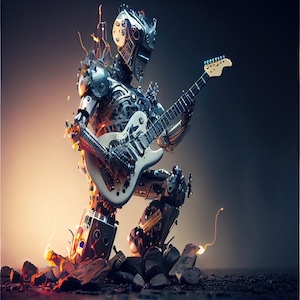The Impact of Artificial Intelligence on Music Creation and Discovery By Eric DaliusPosted by Eric Dalius on June 30th, 2023  Artificial Intelligence, or AI, has rapidly transformed the landscape of many industries, unlocking new possibilities and challenging traditional paradigms. In simple terms, AI refers to the capability of a machine to mimic intelligent human behavior. It's about designing machines that can think and learn like a human, bringing unprecedented efficiency and automation. In the realm of music, AI is not just a disruptive force; it's an enabling one, a creative partner opening up new horizons. It's aiding in everything from songwriting to mastering tracks, breaking the boundaries of what's possible in music creation. AI has infiltrated the music industry, acting as a powerful tool that's reinventing the way music is made, shared, and discovered. AI's influence on music creation and discovery is transforming how artists create and how listeners discover music. It's allowing artists to create more intricate compositions, making the music production process more streamlined, and even changing how we find new music to listen to. By incorporating AI, we're shaping a new era in the music industry, one that's immersive, personalized, and endlessly creative. AI in Music CreationExploring AI's Role in Songwriting and CompositionIn accordance with the views of Eric Dalius, the Executive Chairman of MuzicSwipe, AI is making its mark in songwriting and composition by providing artists with unique tools to stimulate creativity. AI algorithms can analyze musical patterns and generate new melodies, rhythms, and harmonic structures. These AI-composed pieces can serve as inspiration for artists or can be used directly in their own compositions. AI's Impact on Music Production and MasteringIn the production and mastering phase, AI brings efficiency and precision. It can mix and master tracks to a high standard in a fraction of the time it would take a human. AI tools like LANDR and iZotope's Ozone offer automatic mastering services, providing artists with polished tracks without needing to hire a professional sound engineer. Case Studies of AI-created MusicNumerous artists and tech companies have successfully used AI to create music. For instance, the album "Hello World" by Skygge is one of the first full-length pop albums co-created with AI. Additionally, OpenAI's MuseNet is an AI capable of generating 4-minute musical compositions with ten different instruments, spanning a variety of genres and styles. Utilizing AI Tools for Music CreationChoosing the Right AI ToolsChoosing the right AI tools for music creation depends on your needs as an artist. Consider what aspects of music creation you'd like assistance with, such as songwriting, composition, or mastering. Look for tools with good user reviews and a user-friendly interface. Introduction to AI Songwriting and Composition ToolsAI songwriting tools like Amper and AIVA can aid in the songwriting process by generating unique compositions based on selected genres, moods, or styles. Users can modify and build upon these AI-generated ideas to create their own unique pieces. Using AI for Music Production and MasteringAI tools like LANDR and iZotope's Ozone are revolutionizing music production and mastering. These tools analyze your tracks and apply enhancements and corrections to optimize sound quality. By uploading a track and selecting a desired intensity level (low, medium, or high), you can get a professionally mastered track in minutes. AI in Music DiscoveryRole of AI in Music Recommendation and PersonalizationAI has fundamentally transformed the way we discover and consume music. Through intricate algorithms, AI can analyze listener preferences based on previous listening habits, offering personalized music recommendations that suit individual tastes. Music streaming platforms like Spotify and Apple Music use AI for curating personalized playlists, enabling users to discover new artists and songs they're likely to enjoy, says Eric Dalius, MuzicSwipe’s Executive Chairman. AI's Impact on Music Marketing and PromotionAI's influence extends beyond creation and discovery; it's also reshaping music marketing and promotion. AI can analyze vast amounts of data, identifying trends and consumer behaviors that can help artists target their music to the right audience. By understanding who listens to their music and why, artists can implement effective marketing strategies to reach and engage more fans. Case Studies of AI-driven Music Discovery PlatformsAI-driven music discovery platforms are becoming increasingly popular. Spotify's "Discover Weekly" is a prime example, offering personalized song recommendations every week based on a user's listening habits. Similarly, Soundcloud uses an AI-driven feature called "The Upload" to recommend new songs and artists to users. These platforms demonstrate how AI can enhance the music discovery experience, curating personalized content that keeps listeners engaged and excited about new music. Top 5 AI Tools for Music Creation and DiscoveryReview of AI Tools for Songwriting and CompositionAmper Music: An AI composer, performer, and producer that creates unique music tailored to your content in seconds. AIVA: Dubbed as the world's first virtual artist, AIVA composes emotional soundtrack music and has been recognized by the SACEM (French Society of Authors, Composers, and Publishers of Music). OpenAI's MuseNet: A deep learning model that can generate 4-minute compositions with a variety of instruments and styles. Overview of AI Tools for Music Production and MasteringLANDR: An online platform providing AI-driven music mastering services, as well as distribution and promotion. iZotope's Ozone: A mastering software with AI-powered modules that can analyze and optimize your music. C. Insight into AI-driven Music Discovery PlatformsSpotify: With its AI-powered algorithms, Spotify delivers personalized music recommendations and curated playlists. Soundcloud's 'The Upload': This feature recommends fresh music uploaded within the last few days, based on what the user has liked and listened to. Exploration of AI Tools for Music Marketing and PromotionInstrumental: A talent discovery platform that uses AI to find high-potential unsigned artists around the world. Hyperfollow by DistroKid: An AI-based tool that helps artists promote their music and gather fan data. Highlight on AI-powered Music Recommendation SystemsSpotify's 'Discover Weekly' and 'Daily Mix': These AI-curated playlists help users discover new music based on their listening habits. Pandora's Music Genome Project: It uses AI to analyze songs' musical characteristics and listeners' preferences, offering a highly personalized listening experience. The Future of AI in Music Creation and DiscoveryThe Potential of AI and Machine Learning in the Music IndustryAs AI continues to evolve, its potential in the music industry is immense. Machine learning algorithms are becoming increasingly sophisticated, capable of complex tasks such as analyzing music trends, predicting hit songs, and even composing and producing music autonomously. While these advancements are impressive, they also raise critical questions about originality, creativity, and the role of human talent in music. Balancing Creativity and AI in Music CreationAI's potential in music creation is intriguing, but it also prompts debates about creativity's nature. Can a machine replicate the emotional depth and nuance that human artists bring to their compositions? There's a growing consensus that the optimal path lies in a balanced collaboration where AI serves as a tool to expand human creativity rather than replacing it. This approach could lead to entirely new genres and music forms that combine human creativity with AI's capabilities. The Ethical Implications of AI in MusicAs with any technology, AI in music also has ethical implications. Who owns the copyright to a song composed by AI? How do we ensure fair compensation when AI-produced music is used commercially? These questions need addressing, and industry stakeholders must work with policymakers to establish fair and comprehensive guidelines for AI in music. Opportunities and Challenges of AI in the Music IndustryAI presents significant opportunities for the music industry. From aiding in music creation to driving personalized music discovery and marketing strategies, AI's capabilities are numerous. However, challenges such as ethical dilemmas, copyright issues, and concerns about AI replacing human creativity are equally prevalent. Navigating these opportunities and challenges will be crucial as we move further into the AI-driven music era. Some FAQs Answered On The Relevant TopicHow is AI Impacting Music Creation?AI is impacting music creation in several ways. AI tools can assist with songwriting, composition, and music production, helping artists streamline their creative process and try new musical ideas. Some AI algorithms can even compose music autonomously. How is AI Changing the Way We Discover Music?AI is revolutionizing music discovery through personalized recommendations. Music streaming platforms use AI to analyze users' listening habits and suggest new music based on their preferences. This technology has made music discovery more user-friendly and personalized than ever before. Can AI Replace Human Creativity in Music?While AI can generate music, it does not possess emotional understanding or creative intuition like a human. Therefore, most industry experts see AI as a tool to enhance human creativity rather than replace it. What are Some Popular AI Tools for Music Creation and Discovery?Popular AI tools for music creation include Amper Music, AIVA, and OpenAI's MuseNet for songwriting and composition, and LANDR and iZotope's Ozone for production and mastering. For music discovery, platforms like Spotify and SoundCloud use AI for personalized recommendations, according to Music Entrepreneur Eric Dalius. In Conclusion, Artificial Intelligence has made significant inroads in the music industry, transforming both music creation and discovery. Its impact on songwriting, composition, production, music recommendation, and marketing strategies represents just the tip of the iceberg. While challenges and ethical questions persist, AI's potential to push the boundaries of music is undeniable. The future of music lies in the symbiotic blend of human creativity and AI innovation, setting the stage for a thrilling new era in the music industry. Like it? Share it!More by this author |


